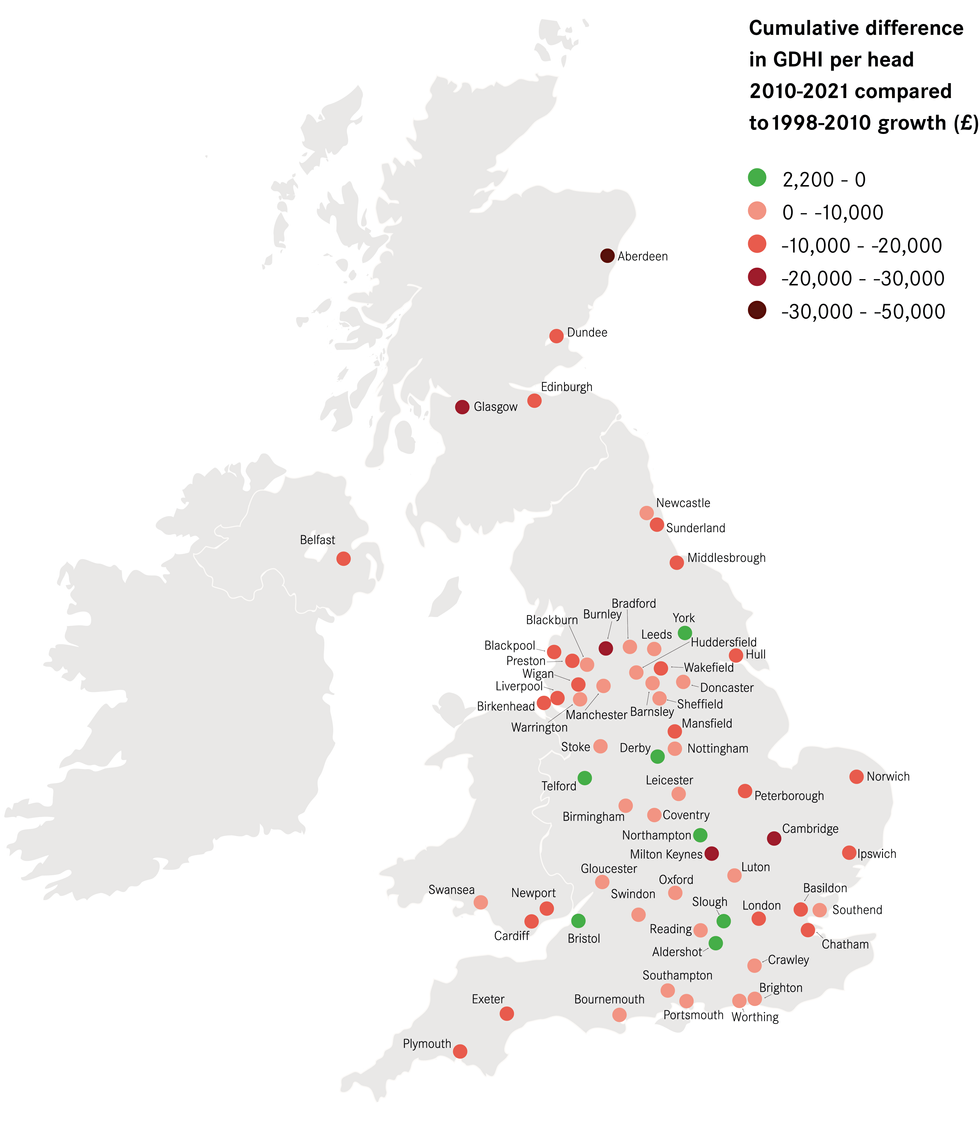Top 10 poorest cities in the UK: Brits losing up to £45,000 in disposable income due to 'flatlining' economy

Disposable incomes have been cut substantially amid low productivity within the UK economy
Don't Miss
Most Read
Britons are up to £45,000 worse-off since 2010 due to the UK’s “flatlining” economy, according to new research. The think tank Centre for Cities has published a new report which has broke down the difference in average disposable incomes across the country’s 63 largest cities.
Nationally, households have been left with £10,200 less to spend on average since the end of the Great Recession. Residents in Aberdeen were found to be worst hit with the average person having a shortfall of £45,200.
Do you have a cost of living story you’d like to share? Get in touch by emailing money@gbnews.uk.

The Centre for Cities report breaks down how much people have lost in disposable income since 2010
|CENTRE FOR CITIES
This was followed by households in Burnley and Glasgow who have lost the equivalent of £28,090 and £23,500, respectively, on average over the last decade and a half.
Those who live in Cambridge and Milton Keynes who would have been £21,000 richer on average if incomes had gone up by the rate of pre-2010 levels.
Only seven cities in the UK saw disposable income growth outperform trends before the economic crash of 2007-09.
According to the Centre for Cities in Cities Outlook report, this shortfall is primarily due to lack of productivity growth within the UK economy despite the country experiencing a jobs boom since 2010.
The average figures for cities are all cumulative figures relative for prices in 2022. Here is a breakdown of the UK cities which posted the biggest losses in disposable income per head if city economies grew at 1998-2010 rates:
- Aberdeen – loss of £45,240
- Burnley – loss of £28,090
- Glasgow – loss of £23,500
- Milton Keynes – loss of £21,610
- Cambridge – loss of £21,340
- Dundee – loss of £17,730
- Birkenhead – loss of £17,540
- Ipswich – loss of £17,390
- Exeter – loss of £16,990
- Plymouth – loss of £16,340.
Andrew Carter, the chief executive of Centre for Cities, highlighted that both the Conservatives and Labour have promised to grow the economy at the next General Election.
He said: “The challenge for the next Government is to go beyond the rhetoric and to do what’s needed to make this rhetoric a reality.
"The UK has had a torrid time since the Great Recession. Everywhere, up and down the country, including places that were doing relatively well before, has been levelled down because of the lack of growth.
“To get growth in every place, the next Government needs to act at a radically different pace and scale, and mark the beginning of a multi-decade policy programme.”
LATEST DEVELOPMENTS:

Disposable incomes have fallen substantially since 2010, according to the think tank
|GETTY
Since 2010, all but two places posted job growth which resulted in more people being pulled into work in nearly every city. In relative terms, London led the pack with total jobs rising by almost 30 per cent which is the equivalent to 1.4 million roles.
However, productivity growth was poor across nearly every city in the UK with it being the major determining factor when it come to wage increases. Some 18 cities were less productive in 2021 compared to 2010.
The report also highlighted that housing costs have risen in most places which has impacted disposable incomes with properties becoming increasingly unaffordable, especially in the Greater South East.
Furthermore, the rates of children in relative poverty has increased in nearly every city and the proportion of young people in relative poverty from working households has also jumped.
GB News has contacted the Treasury for comment.











